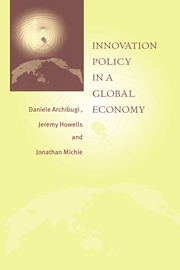Book contents
- Frontmatter
- Contents
- List of figures
- List of tables
- List of contributors
- Foreword
- Preface and acknowledgements
- 1 Innovation systems and policy in a global economy
- Part I National systems of innovation
- Part II Regional, national and global forces
- Part III Globalisation and economic performance
- 9 The political economy of globalisation
- 10 The geographical sourcing of technology-based assets by multinational enterprises
- 11 Innovation as the principal source of growth in the global economy
- 12 The policy implications of the globalisation of innovation
- Index
9 - The political economy of globalisation
Published online by Cambridge University Press: 05 November 2009
- Frontmatter
- Contents
- List of figures
- List of tables
- List of contributors
- Foreword
- Preface and acknowledgements
- 1 Innovation systems and policy in a global economy
- Part I National systems of innovation
- Part II Regional, national and global forces
- Part III Globalisation and economic performance
- 9 The political economy of globalisation
- 10 The geographical sourcing of technology-based assets by multinational enterprises
- 11 Innovation as the principal source of growth in the global economy
- 12 The policy implications of the globalisation of innovation
- Index
Summary
What is called globalisation is changing the notion of the nation state as power becomes more diffuse and borders more porous. Technological change is reducing the power and capacity of government to control its domestic economy free from external influence.
Tony Blair, Leader of the British Labour Party, speaking to Executives of Rupert Murdoch's News Corporation.The plain fact is that the nation state as it has existed for nearly two centuries is being undermined. … The ability of national governments to decide their exchange rate, interest rate, trade flows, investment and output has been savagely crippled by market forces.
Nigel Lawson, former UK Chancellor of the Exchequer.Introduction
The process of globalisation – whether just of technology or of the economy more generally – has profound implications for the conduct of economic policy. Yet there is still little clarity over what the term ‘globalisation’ signifies; over the extent to which the process it denotes has developed; or over the implications of any of this for government economic policy.
The powerless state perspective characterises the world economy as a truly global system which has undermined the ability of national governments to implement effective independent policies (Ohmae, 1990, 1993, 1995).
This view has been challenged, for example, by Hirst and Thompson (1996). However, most such critiques accept the basic premises that, firstly, there has been some increase in globalisation – it is only the extent of the increase which is questioned; and, secondly, that to the extent that the degree of globalisation has increased, the scope for government action is thereby diminished – again, it is only the degree to which government policy has become less effective which is disputed.
- Type
- Chapter
- Information
- Innovation Policy in a Global Economy , pp. 163 - 183Publisher: Cambridge University PressPrint publication year: 1999
- 2
- Cited by



